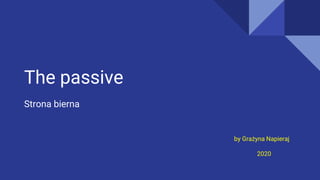The passive
•Download as PPTX, PDF•
0 likes•760 views
Strona bierna - dla uczniów klas 8 SP.
Report
Share
Report
Share

Recommended
Recommended
More Related Content
Featured
Featured (20)
Product Design Trends in 2024 | Teenage Engineerings

Product Design Trends in 2024 | Teenage Engineerings
How Race, Age and Gender Shape Attitudes Towards Mental Health

How Race, Age and Gender Shape Attitudes Towards Mental Health
AI Trends in Creative Operations 2024 by Artwork Flow.pdf

AI Trends in Creative Operations 2024 by Artwork Flow.pdf
Content Methodology: A Best Practices Report (Webinar)

Content Methodology: A Best Practices Report (Webinar)
How to Prepare For a Successful Job Search for 2024

How to Prepare For a Successful Job Search for 2024
Social Media Marketing Trends 2024 // The Global Indie Insights

Social Media Marketing Trends 2024 // The Global Indie Insights
Trends In Paid Search: Navigating The Digital Landscape In 2024

Trends In Paid Search: Navigating The Digital Landscape In 2024
5 Public speaking tips from TED - Visualized summary

5 Public speaking tips from TED - Visualized summary
Google's Just Not That Into You: Understanding Core Updates & Search Intent

Google's Just Not That Into You: Understanding Core Updates & Search Intent
The six step guide to practical project management

The six step guide to practical project management
Beginners Guide to TikTok for Search - Rachel Pearson - We are Tilt __ Bright...

Beginners Guide to TikTok for Search - Rachel Pearson - We are Tilt __ Bright...
The passive
- 1. The passive Strona bierna by Grażyna Napieraj 2020
- 2. Kiedy używamy strony biernej? - Gdy chcemy podkreślić ważność samej czynności, a nie jej wykonawcy. - Gdy nie wiemy, kto wykonuje lub wykonał daną czynność.
- 3. Jak tworzymy zdania w stronie biernej? - za pomocą czasownika be w odpowiednim czasie oraz III formy czasownika (past participle): forma ‘be’ + III forma czasownika
- 4. The passive: present simple The room is cleaned every day. (Pokój jest codziennie sprzątany.) The rooms are cleaned every day. (Pokoje są codziennie sprzątane.) The room isn’t cleaned every day. (Pokój nie jest codziennie sprzątany.) The rooms aren’t cleaned every day. (Pokoje nie są codziennie sprzątane.) Is the room cleaned every day? (Czy pokój jest codziennie sprzątany?) Yes, it is. / No, it isn’t. Are the rooms cleaned every day? (Czy pokoje są codziennie sprzątane?) Yes, they are. / No, they aren’t.
- 5. The passive: past simple This house was built 50 years ago. (Ten dom został zbudowany 50 lat temu.) These houses were built 50 years ago. (Te domy zostały zbudowane 50 lat temu.) This house wasn’t built 40 years ago. (Ten dom nie został zbudowany 40 lat temu.) These houses weren’t built 40 years ago. (Te domy nie zostały zbudowane 40 lat temu.) Was this house built 50 years ago? (Czy ten dom został zbudowany 50 lat temu?) Yes, it was. Were these houses built 50 years ago? (Czy te domy zostały zbudowane 50 lat temu?) Yes, they were.
- 6. The passive: present perfect The room has been cleaned. (Pokój został posprzątany.) The rooms have been cleaned. (Pokoje zostały posprzątane.) The room hasn’t been cleaned. (Pokój nie został posprzątany.) The rooms haven’t been cleaned. (Pokoje nie zostały posprzątane.) Has the room been cleaned? (Czy pokój został posprzątany?) Yes, it has. Have the rooms been cleaned? (Czy pokoje zostały posprzątane?) Yes, they have.
- 7. The passive: will I think the medal will be won by Tom. (Sądzę, że medal zostanie zdobyty przez Toma.) Books won’t be printed on paper in the future. (W przyszłości książki nie będą drukowane na papierze.) Will the games be played indoors? (Czy te gry będą rozgrywane w pomieszczeniu?) Yes, they will. / No, they won’t.
- 8. Strona czynna Strona bierna Andy cleans the kitchen every Friday. The kitchen is cleaned by Andy every Friday. John built this house in 1950. This house was built in 1950 by John. Somebody has stolen her bike. Her bike has been stolen. I think I will do it tomorrow. I think it will be done tomorrow.
- 9. Remember - practice makes perfect... … so now do some exercises :)